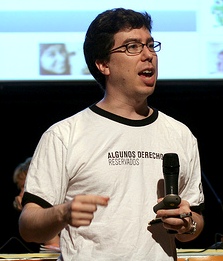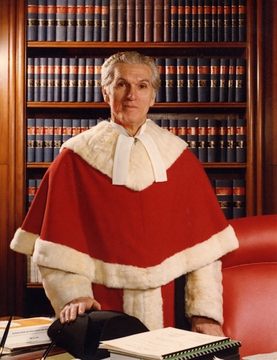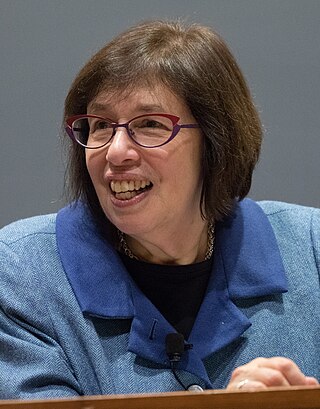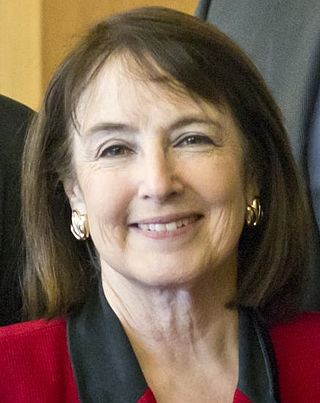An expert witness, particularly in common law countries such as the United Kingdom, Australia, and the United States, is a person whose opinion by virtue of education, training, certification, skills or experience, is accepted by the judge as an expert. The judge may consider the witness's specialized opinion about evidence or about facts before the court within the expert's area of expertise, to be referred to as an "expert opinion". Expert witnesses may also deliver "expert evidence" within the area of their expertise. Their testimony may be rebutted by testimony from other experts or by other evidence or facts.

The Federalist Society for Law and Public Policy Studies (FedSoc) is an American conservative and libertarian legal organization that advocates for a textualist and originalist interpretation of the U.S. Constitution. Headquartered in Washington, D.C., it has chapters at more than 200 law schools and features student, lawyer, and faculty divisions; the lawyers division comprises more than 70,000 practicing attorneys in ninety cities. Through speaking events, lectures, and other activities, it provides a forum for legal experts of opposing conservative views to interact with members of the legal profession, the judiciary, and the legal academy. It is one of the most influential legal organizations in the United States.

Harvard Law School (HLS) is the law school of Harvard University, a private research university in Cambridge, Massachusetts. Founded in 1817, Harvard Law School is the oldest continuously operating law school in the United States. According to the U.S. News & World Report, it currently ranks as the fourth best law school in the United States, trailing only behind Yale Law School, Stanford Law School, and University of Chicago Law School, tied with Duke University School of Law.

Jonathan L. Zittrain is an American professor of Internet law and the George Bemis Professor of International Law at Harvard Law School. He is also a professor at the Harvard Kennedy School, a professor of computer science at the Harvard School of Engineering and Applied Sciences, and co-founder and director of the Berkman Klein Center for Internet & Society. Previously, Zittrain was Professor of Internet Governance and Regulation at the Oxford Internet Institute of the University of Oxford and visiting professor at the New York University School of Law and Stanford Law School. He is the author of The Future of the Internet and How to Stop It as well as co-editor of the books, Access Denied, Access Controlled, and Access Contested.

Douglas Howard Ginsburg is an American lawyer and jurist serving as a senior U.S. circuit judge on the U.S. Court of Appeals for the District of Columbia Circuit. He is also a professor of law at George Mason University's Antonin Scalia Law School.

Bora Laskin was a Canadian jurist who served as the 14th chief justice of Canada from 1973 to 1984. Laskin was appointed a puisne justice of the Supreme Court in 1970, and served on the Ontario Court of Appeal from 1965 to 1970. Before he was named to the bench, Laskin worked as a lawyer and in academia.
In United States federal law, the Daubert standard is a rule of evidence regarding the admissibility of expert witness testimony. A party may raise a Daubert motion, a special motion in limine raised before or during trial, to exclude the presentation of unqualified evidence to the jury. The Daubert trilogy are the three United States Supreme Court cases that articulated the Daubert standard:
Daubert v. Merrell Dow Pharmaceuticals, Inc., 509 U.S. 579 (1993), is a United States Supreme Court case determining the standard for admitting expert testimony in federal courts. In Daubert, the Court held that the enactment of the Federal Rules of Evidence implicitly overturned the Frye standard; the standard that the Court articulated is referred to as the Daubert standard.

The Berkman Klein Center for Internet & Society is a research center at Harvard University that focuses on the study of cyberspace. Founded at Harvard Law School, the center traditionally focused on internet-related legal issues. On May 15, 2008, the center was elevated to an interfaculty initiative of Harvard University as a whole. It is named after the Berkman family. On July 5, 2016, the center added "Klein" to its name following a gift of $15 million from Michael R. Klein.

Charles Anthony Fried was an American jurist and lawyer. He served as Solicitor General of the United States under President Ronald Reagan from 1985 to 1989. He was a professor at Harvard Law School and a visiting professor at Columbia Law School. He also served on the board of the nonpartisan group, the Campaign Legal Center.

Linda Joyce Greenhouse is an American legal journalist who is the Knight Distinguished Journalist in Residence and Joseph M. Goldstein Lecturer in Law at Yale Law School. She is a Pulitzer Prize-winning reporter who has covered the United States Supreme Court for nearly three decades for The New York Times. Since 2017, she is the president of the American Philosophical Society, and a member of the Phi Beta Kappa Senate.

Yochai Benkler is an Israeli-American author and the Berkman Professor of Entrepreneurial Legal Studies at Harvard Law School. He is also a faculty co-director of the Berkman Klein Center for Internet & Society at Harvard University. In academia he is best known for coining the term commons-based peer production and his widely cited 2006 book The Wealth of Networks.

Jay Andrew Rabinowitz was an American lawyer, jurist, and chief justice of the Alaska Supreme Court for four non-consecutive terms, remaining active as a justice from February 1965 until his mandatory retirement in February 1997.
Golan v. Holder, 565 U.S. 302 (2012), was a US Supreme Court case that dealt with copyright and the public domain. It held that the "limited time" language of the United States Constitution's Copyright Clause does not preclude the extension of copyright protections to works previously in the public domain.

Charles D. Swift is an American attorney and former career Navy officer, who retired in 2007 as a Lieutenant Commander in the Judge Advocate General's Corps. He is most noted for having served as defense counsel for Salim Ahmed Hamdan, a detainee from Yemen who was the first to be charged at Guantanamo Bay; Swift took his case to the US Supreme Court. In 2005 and June 2006, the National Law Journal recognized Swift as one of the top lawyers nationally because of his work on behalf of justice for the detainees.

Nancy Gertner is a former United States district judge of the United States District Court for the District of Massachusetts. She assumed senior status on May 22, 2011, and retired outright from the federal bench on September 1, 2011. She is now a professor of practice at Harvard Law School.

William "Terry" W. Fisher III is the WilmerHale Professor of Intellectual Property Law at Harvard Law School and faculty director of the Berkman Klein Center for Internet & Society. His primary research and teaching areas are intellectual property law and legal history.
Isaac Lidsky is an American corporate speaker, author, actor and entrepreneur. Before losing his sight, he played Weasel on NBC's Saved by the Bell: The New Class. He is the first blind person to serve as a law clerk for the U.S. Supreme Court. He is CEO of ODC Construction, a residential shell contractor in Florida.
In the case of Sony BMG Music Entertainment et al. v. Tenenbaum, record label Sony BMG, along with Warner Bros. Records, Atlantic Records, Arista Records, and UMG Recordings, accused Joel Tenenbaum of illegally downloading and sharing files in violation of U.S. copyright law. It was only the second file-sharing case to go to verdict in the Recording Industry Association of America's (RIAA) anti-downloading litigation campaign. After the judge entered a finding of liability, a jury assessed damages of $675,000, which the judge reduced to $67,500 on constitutional grounds, rather than through remittitur.
The NEXA Center for Internet & Society is a research center founded at the Department of Control and Computer Engineering of Polytechnic University of Turin. It is an academic research center which studies the Internet with a multidisciplinary approach: technical, legal and economic.














